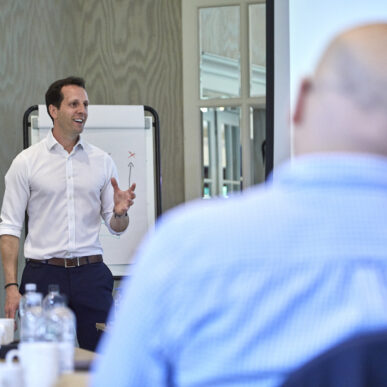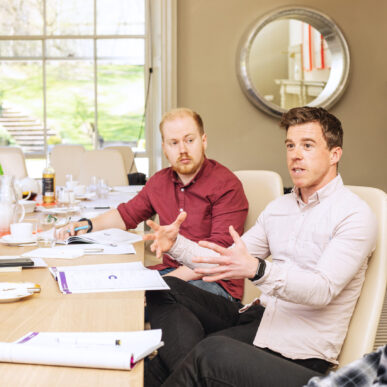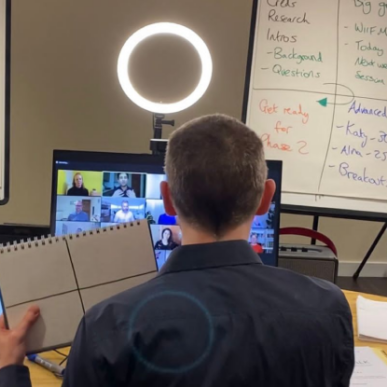7 Important Lessons On Performing Well Under Pressure
Almost everyone feels pressure before giving a presentation.
You might be nervous about speaking in front of others. Or, you could be worried about your information actually sticking with your audience.
Regardless of the cause, anxiety before giving a big talk can be detrimental to your actual performance.
But there are things you can do to avoid these effects.
What your brain really needs to perform well under pressure is to have its three major parts managed well.
That means paying attention to how you’re handling your logical mind, your emotional mind, and your instinctive mind.
For example, we might know logically what we’re supposed to do in a meeting, but in the heat of the moment, it’s the emotional mind, survival instincts, and habits that take over.
So the key thing is to manage all three areas of your mind so they’re able to work together when the pressure comes in.
Here are a few simple ways you can do that:
1. VISUALIZE THE EVENT FROM START TO FINISH
First things first — imagine logically how everything will go to get you the perfect result.
Walk through the event from start to finish in your mind, from entering the front door to walking away triumphant. Imagine staying calm and composed even if things go wrong or you get difficult questions.
Then ask yourself — what do I need to do between now and the event in order to be fully prepared for success? Create a plan to accomplish your desired goal. This will put your logical mind nicely at ease.
I do this myself.
At least two weeks before an important event, I start visualizing exactly what I want to do.
I do it over and over again so that it becomes natural for my mind to be heading in that direction.
2. MAKE PRESENTING A HABIT
It’s often said in the theater: “Amateurs practice until they get it right, but professionals practice until they can’t get it wrong.”
This doesn’t mean you practice something over and over until it becomes robotic. You don’t need to say exactly the same words and make the same movements every time.
If you’re delivering a pitch or a presentation, you need to practice delivering it in an engaging, natural way.
By doing this, you will create muscle memory so that when you feel pressure, you’re able to instinctively deliver your presentation the way you’d like.
I’ve had to rely on this myself sometimes — when technology fails, I get caught in bad traffic, or the client arrives feeling stressed out and my monkey mind starts to worry.
My mind is feeling under pressure, but I’m able to fall back into that instinctive habit of speaking calmly, professionally, and in an engaging way.
It’s simply about creating a great, reliable habit.
3. PRACTICE MANAGING YOUR MONKEY MIND
I talk a lot about your “monkey mind” and how it’s crucial that you learn to soothe it, if you want to perform at your best in critical moments.
Your monkey mind is simply the part of your brain that wants to keep you safe. It wants you to survive, so it tries to talk you out of doing anything it perceives as “dangerous.”
It might perceive public speaking as dangerous because it’s scary and unknown, so you have to ease it’s anxieties.
You can try meditation apps or controlled breathing exercises to do this.
I advise a breathing pattern that lowers your heart beat and removes adrenaline from your body. I call this ‘5552’. You breathe in for a count of five, hold for five, and breathe out for five, then hold for two.
4. GO FOR A WALK ON THE BIG DAY
On the day of an event, I encourage people to go out for a good long walk or even a short run.
I do this every day because it helps my body and mind wake up and gets my blood flowing. Blood flow is good for your ability to think clearly, and it helps to prime your mind for success.
I also always arrive early for an important event, so I reduce any pressure from time constraints.
During a talk, to avoid the monkey mind shutting down and getting me to rush out of the situation, I just remind myself how I want things to end, creating a clear picture or sensation of enjoying the ending and gaining great feedback.
5. TAKE THE FOCUS OFF OF YOURSELF
If you’re feeling anxiety, chances are you’re focusing on yourself, not on other people.
So instead, think about the audience and realize that the pitch, the presentation, the speech — it’s not really about you.
Your presentation is all about the other person.
Turn your focus on them, and you’ll start to notice things you hadn’t before.
Anything you notice can help your mind start to think much more about them, much less about you, and the self consciousness will start to disappear.
6. PAY ATTENTION TO YOUR EXHALES
You may have heard the advice that to calm down you should just “take a deep breath!”
It doesn’t work, because this makes people breathe in to their upper chest, which increases a feeling of tension and anxiety.
What you need to do, if you’ve got anxiety, heart palpitations, or a quivering voice, is to focus on breathing out.
If you’re in an interview situation where someone’s asking you tough questions, silently focus on breathing outwards. Just push the air out.
If you’re delivering slides or a pitch, in between slides just push the air out of your body, and then relax.
It will allow you to start diaphragmatic breathing, which will calm your heart rate and keep your voice calm.
7. STAND STRONG
Finally, one extra thing you can do in the moment is to stand strong.
When people have adrenaline pumping, as frequently happens with public speaking, they tend to want to move around a lot. They’ll move their arms if they’re sitting down or they’ll tap their foot up and down. They might start to walk around for no reason and with no direction.
If you want to settle the adrenaline, it’s much better to focus on stillness.
Stillness tells your body, “Ah, we must be in a calm, safe situation.” It starts to shift away from the anxiety and moves toward a feeling of being settled.
To learn more about how we can help you please contact our team.





















